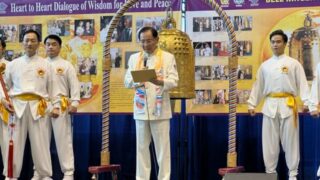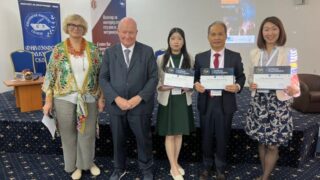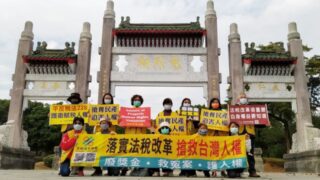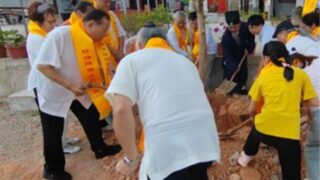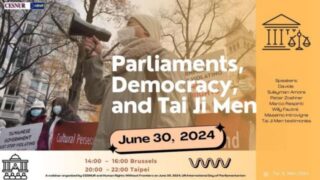Several events presented the Tai Ji Men case in connection with one of the world’s largest freedom of religion events.
by Daniela Bovolenta


On July 1, 2022, a hybrid seminar was organized, at the Renaissance Hotel in Washington DC and online, by CESNUR, the Center for Studies on New Religions, and Human Rights Without Frontiers on “Effective Parliamentarism and the Tai Ji Men Case.” It was held after the United Nations International Day of Parliamentarism, June 30, and after the International Religious Freedom Summit of June 28–30, one of the largest religious liberty events in the world, in Washington DC. Speakers included U.S. Secretary of State Antony Blinken, the current U.S. Ambassador-at-large for International Religious Freedom Rashad Hussain, Speaker of the House Nancy Pelosi, and former Secretary of State Mike Pompeo.
Tai Ji Men were an important presence in the Summit. Their Shifu (Grand Master), Dr. Hong Tao-Tze, attended the event and delivered a message. Several international leaders attended Tai Ji Men’s beautiful cultural performances and rang the Bell of World Peace and Love, including the co-chairs of the Summit, former U.S. Ambassador-at-large for International Religious Freedom Sam Brownback, and Dr. Katrina Lantos Swett, President of the Lantos Foundation for Human Rights and Justice.


Marco Respinti, an Italian journalist who serves as director-in-charge of Bitter Winter, recalled the French origins of the word “Parliament,” and introduced a video contrasting the solemn proclamations of the Taiwanese government about human rights and freedom of religion or belief and the reality of the continuing discrimination of Tai Ji Men.
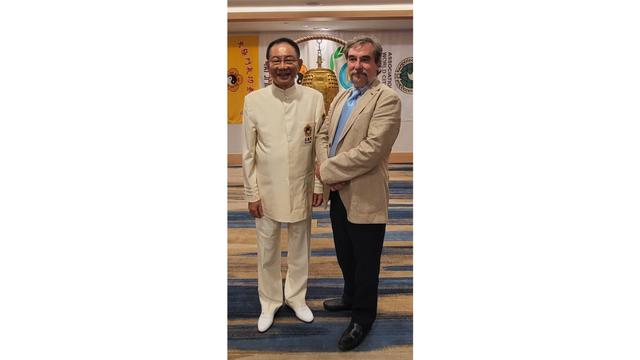

Respinti then introduced four scholars. The first, Massimo Introvigne, an Italian sociologist and the editor-in-chief of Bitter Winter, presented a history of parliamentarism in Taiwan and of the elections of 1992 that led to a fully elected Legislative Yuan. Taiwan now promises to implement transitional justice, i.e. the measures to recognize and indemnify victims of authoritarian policies and punish those responsible of human rights violations. On May 31, 2018, a Transitional Justice Commission was established in Taiwan, with the mandate to deal with human rights and legal abuses perpetrated during the period between 1945 and 1992—but not after 1992. It thus excluded post-1992 human rights abuses such as the Tai Ji Men case, which started in 1996.
With examples from “old” democracies such as the United States, Canada, Australia, and Switzerland, Introvigne explained that it is now acknowledged that violations of human rights requiring transitional justice may also have occurred while Parliaments were freely and democratically elected. This should be recognized also in Taiwan and with respect to the Tai Ji Men case, Introvigne concluded.
Thierry Valle, president of the United Nations ECOSOC-accredited NGO CAP-LC, discussed the history of parliamentarism in France. He argued that also in France Parliaments may vote provisions that violate human rights, as it happened in the last decades of the 20th century with measures against “cults.” Although the situation in Taiwan is different, Valle said, the Tai Ji Men case demonstrates that the same intolerance against independent spiritual minorities may be at work there.
Holly Folk, a Professor of Religious Studies at Western Washington University, explained how the label “cult” is used to discriminate against unpopular minorities. The label is often at work together with widespread prejudices against religion and spirituality and bureaucrats’ hostility against independent movements in general. These problems are global, Folk said, and also manifested themselves in the Tai Ji Men case in Taiwan.
Donald Westbrook, a lecturer for the School of Information at San José State University and the School of Information at the University of Texas at Austin, returned to the recent review of Taiwan’s compliance with the United Nations Two Covenants as a “missed opportunity,” as serious issues of tax justice and freedom of religion and belief were not addressed. He also presented his own ongoing research of Tai Ji Men and his use as a source of the recently published Tai Ji Men book “Embodying the Wisdom of Tai Ji.”
Alessandro Amicarelli, President of the European Federation for Freedom of Belief (FOB), distinguished between “parliamentarism” and “effective parliamentarism.” No democracy is perfect, he said, and no parliamentarism is fully effective. Taiwan’s parliamentarism was born comparatively quickly and, while being a significant step towards a full-blown democracy, still does not guarantee the full respect of human rights, as evidenced by the Tai Ji Men case. He also reiterated that the Tai Ji Men case and tax justice problems should have been discussed during the 2022 revision of Taiwan’s compliance with the Two Covenants.


Willy Fautré, co-founder and director of Human Rights Without Frontiers, reminded the audience that the aim of the International Day of Parliamentarism is to make Parliaments more effective and more protective of human rights, which does not always happen when it comes to spiritual minorities, whose rights are often violated.
Fautré then introduced three dizi (disciples) of Tai Ji Men who offered their testimonies. Jessica Kuo, a counselor supporting the mental health and wellness education of immigrants in Canada, speaking on Canada’s National Day, explained that after some sensational cases the Canada Revenue Agency (CRA) has increasingly punished tax officers for misconduct in recent years, with penalties, suspensions, and even dismissals. This has not happened in Taiwan, Kuo said, where the Tai Ji Men case shows that the system protects and even rewards corrupt tax bureaucrats rather than punishing them.
Hsia Lung Ogle, a veteran 81-year-old female dizi and a retired English teacher living in Florida, presented a testimony about the suffering inflicting on Tai Ji Men by both ill-founded legal and tax actions and media slander. Coming from a family that experienced first-hand repression in Vietnam and Cambodia, she said, she may offer a testimony of the catastrophic consequences caused by violations of human rights and freedom of religion or belief.


Ashley Huang, a student from Taiwan and a dizi, also mentioned the 2022 review of Taiwan’s compliance with the Two Covenants, its findings about human rights problems still unsolved there, and its failure to address tax issues and the Tai Ji Men case. Huang said she sees the Tai Ji Men case as a test for Taiwan’s democracy. The continuing failure to solve it severely damages Taiwan’s international credibility as a pro-human-rights system, she concluded.
Camelia Marin, deputy director of the NGO Soteria International, concluded the webinar noting how serious is the fact that sacred land, intended for a self-cultivation center of Tai Ji Men, has been confiscated although the movement has been recognized as not being guilty of anything. She expressed the hope it may be returned to Tai Ji Men, its legitimate owner. Marin also introduced a final video where Katrina Lantos Swett shared her feelings after ringing the Bell of World Peace and Love, an experience, she said, she will remember for all her life.


During the IRF Summit, other events also discussed the Tai Ji Men case. On June 30, Action Alliance to Redress 1219 organized in the same Renaissance Hotel one of the Summit’s side events, on “The 2022 Review of Taiwan’s Implementation of the Two UN Human Rights Covenants and the Tai Ji Men FORB Case.” Speakers included Amicarelli, Westbrook, and others, who analyzed the violations of the Two Covenants in the Tai Ji Men case.
On the same day and in the same hotel, another side event explored the theme “Tai Ji Men: International Ambassadors of Peace and Goodwill and Their FORB-Case.” Respinti, Folk, and Pamela Chen, a dizi and a customer service manager in a U.S. company, contrasted the massive international action by Tai Ji Men to promote global peace and dialogue with the persecution and injustice they suffer in Taiwan.
A petition to the President of Taiwan asking her to solve the Tai Ji Men case, signed by leading international scholars of religion and human rights activists, was also introduced at the Summit.






